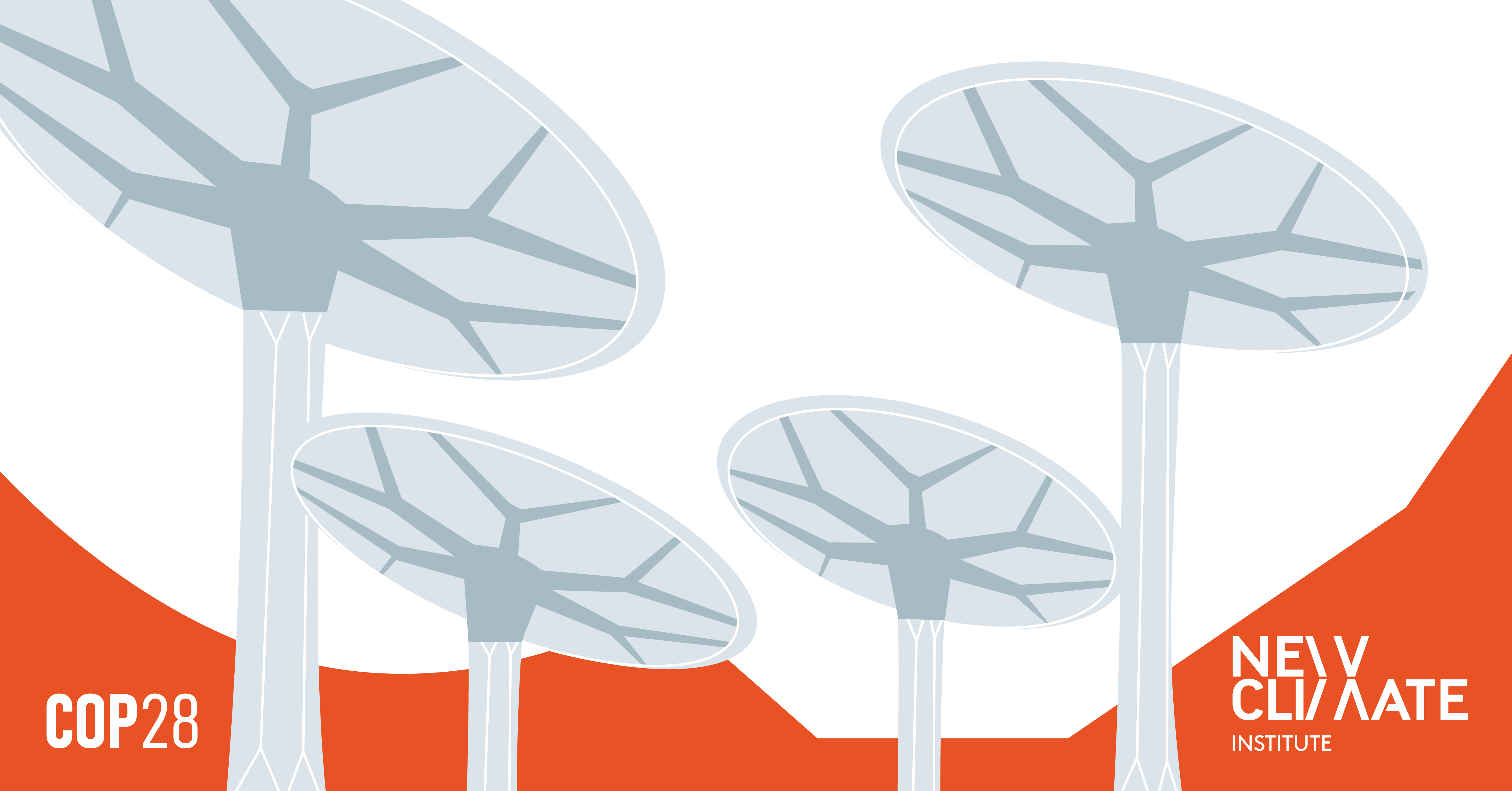
The 28th Conference of Parties of the UNFCCC (COP) takes place from 30 November - 12 December 2023, at the end of another year of record-high temperatures and climate change impacts, which are rapidly increasing in frequency and intensity, causing loss of livelihoods around the globe, and particularly in vulnerable developing countries. We hear more and more voices saying that “we will not make it” and “we are doomed”. However, the past decades have shown that positive change can happen faster than expected and that we have all the tools to protect this planet and its inhabitants. COP28 has a choice to make: Does it give in to the fossil fuel lobby, doomsdayers and populism, or can it make things happen that were before unimaginable, but are now possible and in fact necessary to steer the ship around, toward a globally just, 1.5°C-compatible future?
Experts at NewClimate Institute have followed the international climate negotiations for decades. This year, we want to stress the urgency with which we need to tackle climate change, and highlight the following topics we work on:
Progress lacks on all fronts: The Global Stocktake will find that action so far has been vastly insufficient to get on track for the goals agreed in the Paris Agreement. Global temperature is projected to increase to 2.5°C to 3.0°C above pre-industrial levels (Climate Action Tracker temperature update is due 5 December), with many countries having set too weak mitigation targets, not increasing ambition of targets over time as the Paris Agreement mandates, and many not meeting their targets. Only solar energy and electric vehicle uptake are on track towards a 1.5°C-compatible future, all others are not. Developed countries missed the 100 billion climate finance target set for 2020 for various years, and may just about have achieved it in 2023. Experts criticise the quality of the finance and the lack of finance for adaptation. Sustainable development, which sets the context for all actions in the Paris Agreement, has strongly suffered, first from the COVID-19 crisis and then from the energy crisis caused by the illegal Russian invasion of Ukraine. Companies are now on board but often engaging in greenwashing rather than real climate action. The Global Stocktake will show some improvements since Paris but will overall illustrate a massive gap in what we should be doing compared to reality.
We must focus on just, inclusive and sustainable transitions: Just Energy Transition Partnerships (JETPs) have gained some traction since South Africa in Glasgow agreed to transition its power sector with support from international donors. Indonesia and Viet Nam have followed similar processes. The earlier euphoria has cooled down a little given the problems in the implementation, yet the fact that climate action needs to go hand in hand with development priorities is more prominent than ever in international conversations. One example is considering the effects of a transition away from coal on employment, or ensuring the development of green hydrogen fosters benefits for developing countries and does not merely satisfy the energy demand of the global north.
The fossil fuel lobby needs to pack up: The UNFCCC expects more than 70,000 participants at COP, and it will not come as a surprise to find that the private sector and particularly fossil fuel companies have a seat at the table. The team around Mr Al Jaber, the COP president and CEO of the UAE’s state-owned oil company, is doing a lot to make themselves, the UAE and fossil fuels look green: They are a strong supporter of the tripling RE target, UAE are a large provider of climate finance to Africa and may be paying into the loss and damage fund, despite it being a developing country under the UNFCCC. Yet they do all of this while expanding their oil and gas sector. And the UAE is just one country of many that bet on fossils. The Climate Action Tracker briefing from June highlights the activities of major oil and gas producers, like the US, Australia and Norway and shows that no major producer has plans to downscale their activities. Fossil fuels have no space in a Paris-aligned future, and the international climate negotiations have to recognise this.
Corporate climate action needs to be scrutinised: Companies increasingly react to the pressure from investors, courts and the public to engage in climate action. Unfortunately, many companies still make themselves look much better than they are - greenwashing. The financial sector is also struggling with the task. Corporate accountability remains high on the agenda with the UNFCCC Secretariat’s Recognition and Accountability Framework (RAF) and a draft implementation plan that was released in June 2023 to better enable the UNFCCC to support high-integrity climate action and prevent greenwashing of non-state actors. A recent NewClimate publication on the Corporate Climate Accountability Loop recommends elements that an effective compliance mechanism should cover.
We have the tools at hand: Since the Paris Agreement, we have seen progress despite the unfavourable geopolitical situation. We see an improvement of visions, goals and policies, we see investors and businesses under pressure, we see more civil action than ever, and in the energy sector the move to renewable energy and electrification of demand sectors is irreversible. Imagine how such shifts could take off if the global environment were fully supportive.
This COP needs to urgently recognise the gap in ambition and action that the Global Stocktake and scientific evidence reveal and give the negotiations a mandate to provide stronger guidance on the required direction: The ratcheting up mechanism of the Paris Agreement with the Global Stocktake and consequent NDC updates has the objective of increasing ambition over time. This approach has worked to some extent, and the bottom-up process includes actions across all countries. Yet, climate change is progressing faster than expected, and the advances of the global ambition to fight climate change are not keeping up with that pace. The Paris Agreement does not foresee a plan B, in case the ratcheting mechanism fails. There is no compliance mechanism or a tool to ramp up action in a top-down manner. The negotiations could agree on additional, globally valid guidance, for example by when to end subsidies for fossil fuels or applications dependent on those or to what extent emissions from food production should decrease. COP could also initiate a Race to the Top by comparing the sectoral performance of countries, without naming individual countries. It is also imperative for the international community, especially the EU and its Member States, to expand climate diplomacy efforts beyond the UNFCCC negotiations and towards a more holistic and geopolitical approach that integrates climate into all relevant policy channels, including finance, international trade, foreign security and industrial policy.
NewClimate Institute will be present in Dubai with a critical and constructive voice. We will host and participate in multiple events. Additionally, we will release several related publications before and during COP28. All details on our "NewClimate Institute at COP28" page.








